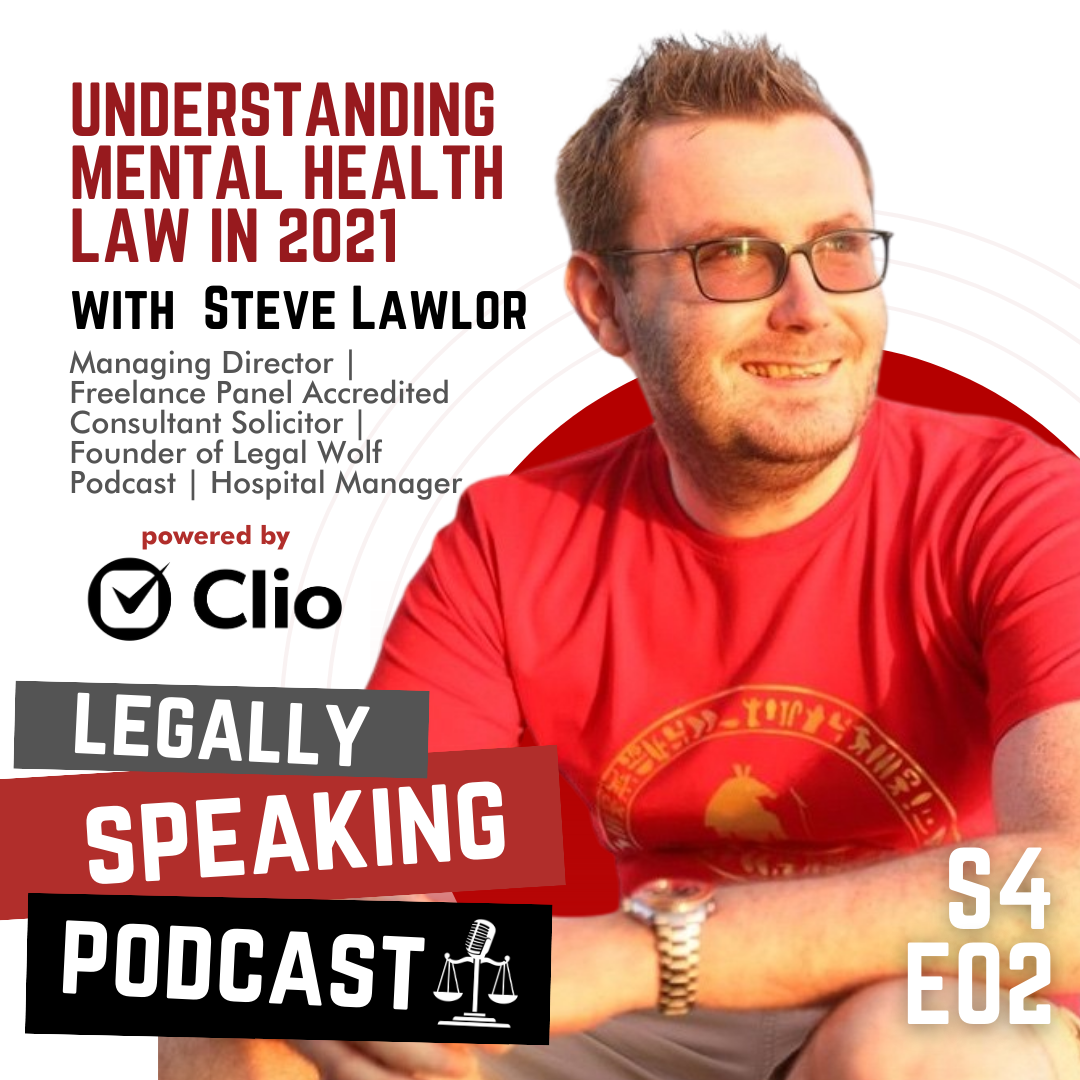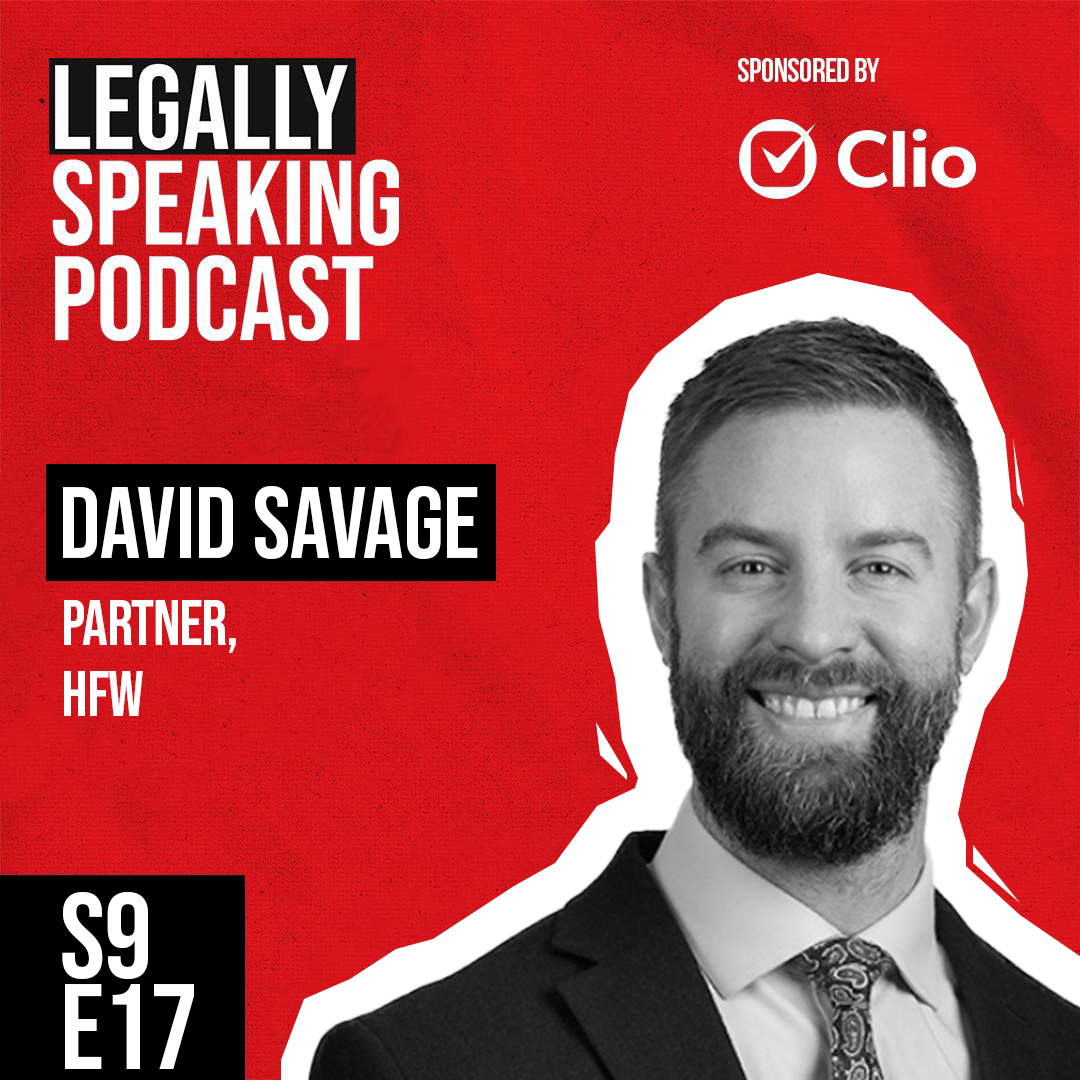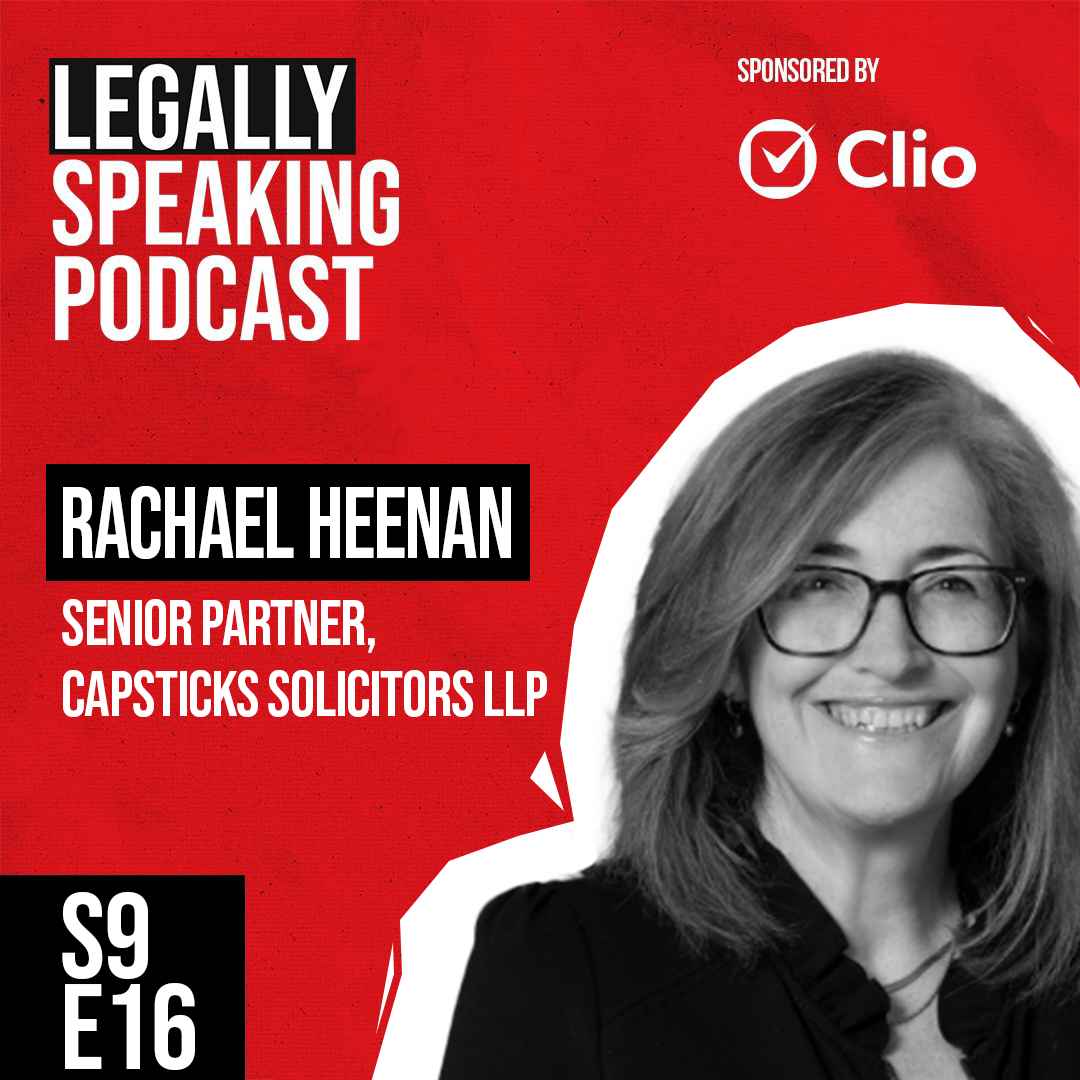
LegalTechTalk Uncovered 2025 – Jonathan Williams – E04
On today’s episode of LegalTechTalk Uncovered 2025, we speak to Jonathan Williams of Legora, an agentic

In this episode of the Legally Speaking Podcast, our host Robert Hanna speaks to Steve Lawlor.
Steve runs Lawlor’s Law Limited, a legal consultancy firm specialising in mental health law. As well as advising law firms, the consultancy trains medical professionals to help them better understand the issues, especially in relation to the Mental Health Act 1983.
He’s also hosts the Legal Wolf podcast and mentors law students. In this episode he shares his story, describes the world of mental health law and gives his own wellbeing tips. Furthermore, he analyses how mental health issues are approached in the legal profession and what more still needs to be done.
Topics also include:
Robert Hanna (00:00):
Welcome to the Legally Speaking Podcast. I’m your host, Rob Hannah. This week I’m delighted to be joined by Steve Lawlor. Steve is the managing director of Lawlor’s Law Limited, a company which provides consultancy services to mental health law firms and offers trainings to those such as medical professionals and independent mental health advocates on the use and implementation of the Mental Health Act 1983. Steve also works as a consultant mental health solicitor at Mander Cruickshank Solicitors, a student mentor at the University of Wolverhampton, and a visiting lecture at the University of Law. In addition to this, Steve founded the Legal Wolf podcast last year in which he discusses mental health law and has interviews with professionals to provide a detailed insight into this area. In his spare time, Steve enjoys watching his football club Wolverhampton Wanderers. So a very warm welcome, Steve.
Steve Lawlor (00:58):
Thank you, Rob. Thank you for having me on.
Robert Hanna (01:02):
It’s an absolute pleasure, and before we dive into everything you’re doing in the legal space at the moment and your achievements to date, we do have a customary icebreaker question here on the legally speaking podcast, Which is: on the scale of one to 10.
Robert Hanna (01:19):
10 being very real, how real would you rate the reality hit series ‘Suits’. On a scale of 1 to 10?
Steve Lawlor (01:27):
Um, that’s very good question. I’d probably say a three or a four.
Robert Hanna (01:37):
Okay. And anything you would add to your reasoning? I think that’s a very fair answer below five for most people in the legal field, but, uh, anything you would add to that number
Steve Lawlor (01:46):
Just because when you’re at university, they kind of promote corporate and commercial law and they say, look at suits. That’s how it’s going to be. Whereas it’s not necessarily going to be that glamorous. Certainly not that well-paid to begin with. It’s safe to say that it’s a dramatization of the legal profession, Suits, and people shouldn’t take it as reality.
Robert Hanna (02:15):
I think you’ve put that fantasticlly well, I think if you want a bit of Hollywood and a bit of drama in your life, then definitely go and watch it. If you’re looking for careers advice and the reality of the law probably venture elsewhere. So let’s start at the beginning then. Tell us a bit about your family background, and upbrining.
Steve Lawlor (02:31):
Okay. So I am a single child, um, in delay and I was the first person in my family to go to college and also go to university to study Law with Criminology. Very good, happy upbringing, as a child, couldn’t have asked for anything better to be truthful. My parents just wanted me to be happy and to do something that I enjoy. Hence I got into law for the first time that I experienced the legal profession was on work experience when I was, it must have been year 6, when I went on a weeks, legal experience and because of my age, I was very limited in what I could do. So it was mainly filing and looking at things but not necessarily doing anything more than that, but I just got the book from there, chose not to do law at A-Level because I had heard that the first year of the LLB is the same as what you do at A-Level levels. So I didn’t want to repeat anything. And then I took the plunge and did law at university and here I am now 10 years on qualified solicitor for three years called the 1st of March.
Robert Hanna (03:56):
Wow. There we go. And we’re definitely going to talk a lot more about that. And because before becoming the managing director at Lawlor’s law limited, you worked as a mental health law solicitor at Donovan, Newton limited, I believe. What was that like? And what experiences did that provide you with?
Steve Lawlor (04:15):
So, um, it was all remote working, so there was no office to essentially go to. So it was very good preparation for COVID-19. Um, because you’re used to working at home in front of two or three screens. We just keep flicking from one to the other. In terms of what I learned there, I did progress a lot in terms of my mental health experience and knowledge, by way of coming up with more complex cases, the more experience I gained within the mental health profession and the better your reputation increases, you tend to get more complex cases. And I learned how to deal with third parties, such as social workers, social services, how you interact with those kinds of professionals. When you want to get your point of view across working with independent experts. So how you word letters to them outlining exactly what you want and then your advocacy skills, both the hospital manager’s hearing and mental health tribunal’s kind of developed when I was at Donovan Newton, but it’s more of self-taught experience because it’s the kind of environment whereby you don’t get the opportunity to observe other people. So you kind of develop your own style as you go. The only way that you get to observe is when you apply to become panel accredited, and you have to observe a colleague of yours at an unrestricted case, a restricted case and another case, which is usually a community-based patient. So that’s the only time that you observe. And then you tend to develop your own technique, your own style, your own way of opening a tribunal hearing your own way of questioning your client and cross-examining other witnesses. So that did develop whilst I was at Donovan Newton as well.
Robert Hanna (06:12):
Okay. And it’s interesting, you mentioned that was virtual, right? The way from the start, you know, almost quite clairvoyant situation in hand, but what do you think were some of the positives and negatives of that? Beacuse I think that’s quite topical for the here and now, what was your experience of that virtual?
Steve Lawlor (06:29):
Yeah, so I mean, the fact that your not in an office and you’re working from home that has its challenges being a mental health lawyer is essentially a very isolative route to go down. So we still went out and about to see clients within psychiatric hospitals in terms of doing the initial sign ups and attending the tribunal hearings and hospital managers hearings. But I would guess the negatives of remote working is that you don’t have the opportunity to bounce ideas off of the people. I mean, there’s a WhatsApp group, which is great, but it’s not ideal for bouncing ideas off. So that’s one of the negatives. In terms of the positives of remote working, you can obviously have more of a work-life balance and you can plan your day accordingly. But essentially that is the majority of the time you sat in a car driving from place to place because of the distances that you covered during the day from going to a variety of hospitals. So it can be a very lonely and isolative field and it takes a certain kind of individual to specialize within mental health law.
Robert Hanna (07:50):
Yeah. It’s Interesting. You mentioned work-life balance because I think certain people, and I definitely understand where you’re coming from with that, but I think certain people have actually struggled with work-life balance with working from home in terms of actually when to switch off, you know, workload and everything else. So is there any tips you would share from that experience that allow, you know, which you used and did you use for actually getting that work-life balance?
Steve Lawlor (08:13):
Yeah, I mean, in terms of tips, I would probably say that you would have to put boundaries in place. So I live on my own. I’ve recently moved into my parents because that’s obviously locked down 3.0. Um, so I used to work in my second bedroom. So when there comes a cutoff point, I just close the door and then don’t go in there til the following morning. And likewise, as soon as a certain time passes, i.e. Five, 5:30 PM. My phone goes on silent. And if there’s any calls and if there’s any texts or emails, they get left until the morning. So it’s about having, having structure to your day and kind of setting boundaries to your clients, because I know a lot of lawyers, they have this viewpoint that they have a responsibility, 24/7 , they have to look out for their clients all of the time because their clients are obviously at the forefront of their mind. And if a client calls you feel an obligation to answer it, despite it being eight, nine o’clock at night. So it’s just a case of putting boundaries in place to make it aware to yourself that between eight and five is your working day after that, put it down, recharge and go again the following day. So that, that would be my, my main tip.
Robert Hanna (09:47):
Okay. Okay. No, and that’s good. I think, like you say setting boundaries, I went the extreme with lockdown. Um, I bought a dog, so the dog needs walking twice a day. So, you know, there are two definitive walks throughout the, the day that get me out of the house. So, uh, yeah, I guess I went a slightly different route, but I, I definitely hear what you’re saying. So we gave a very brief overview of Lawlor’s Law Limited at the start, but can you tell us more about the company and what it actually does?
Steve Lawlor (10:15):
So I decided to set up Lawlor’s Law Limited last year, and it was set up as a company in July, but it wasn’t officially properly going until October time. And the reason I set it up was because I wanted to have more freedom and flexibility over the work that I did that I chose to do. And some people thought I was crazy setting up in the middle of a pandemic and all the outgoing costs to begin with. In actual fact, it’s the best thing that I’ve ever done, I would never have had the opportunity to train medical professionals, which is something that I’m keen to get more involved with in terms of enhancing their knowledge on the mental health act and how that can be implemented in various scenarios, be it with doctors, nurses, independent mental health advocates, training doctors in how to write good report to a standard that is appropriate for a mental health tribunal or hospital managers, and also to train hospital managers in how best to question witnesses within a hearing just to improve and enhance the quality of the managers hearings. Also, I wouldn’t have had the opportunity to be a student mentor at the university of Wolverhampton. Wouldn’t have had the opportunity to set up my own podcast and all the opportunities come your way, for instance, being a consultant solicitor and the Crookshank. The sole reason why I set it up was to have more freedom and flexibility. And if anyone is thinking that they might be unhappy where they are, and they’re thinking of taking the plunge and setting up on their own, my advice is go for it because there is no better time to set up.
Robert Hanna (12:05):
Agreed.
Steve Lawlor (12:05):
in the middle of a pandemic, because if you can survive and float in the middle of a pandemic, you will thrive when we are eventually out of the pandemic.
Robert Hanna (12:16):
I couldn’t agree more. I, I think, you know, I always encourage people whenever they’re thinking about starting a business, the right time is always now and even more so with the, the, the, the pandemic, you know, times are going to get better. Um, and never to believe so, yeah. With this experience behind your belt. So is there any tips that you would give to people who probably are sat there thinking, wow, that’s quite inspiring. They’ve, they’ve set up the business in the pandemic, but they’re still on the fence. Is there anything, you know, you did practically as part of your sort of thought process or anything that you would share around kind of, you know, how you made it happen?
Steve Lawlor (12:49):
So one of the first things I did was contact an accountant and go through the figures, the logistics of how much it would cost to set up a company, what would be involved, what the accountant fees were. I also made sure I had some money behind me to begin with, which I saved from my wages from the previous firm in order for me to be able to pay out on getting the best equipment and in order to have the company on the best footing possible. Also, if you’re thinking of going self-employed and setting up on your own, make sure that you’ve got some contracts lined up, ready to go before you move, because the last thing you want to do is move, and then all of a sudden there’s no work. There’s no money whereby if you’ve got some idea that there are contracts that you could get in place, like for instance, with me with, with Cruickshanks who signed the consultancy agreement, then the notice goes in, and I think that’s important to make sure that you have something to go to before you leave to set up your own company.
Robert Hanna (14:02):
Yeah. Uh, and you’re speaking my language yet again Steve, because before I set up KC Partners, my legal recruitment firm, I made sure I had all my ducks in a row to ensure that we could hit the ground running. And that does mean if you’re serious about it, you know, taking time to, to do that outside of your, your day job. And another great point you touch on there is about the importance of infrastructure and quality suppliers in terms of accountants, even good lawyers and people that can really help you because as you try to grow your business, not just from a headcount perspective, but from a client perspective, you want to make sure you’ve got the foundation set. It’s like building a house. So absolutely right. In terms of the accountants and looking at the financials and the projections and things like that. Okay. So the company aims to develop medical professionals, knowledge and understanding of the Mental Health Act 1983 in a constructive but fun way. Can you explain why this is so important to do?
Steve Lawlor (14:57):
Because I feel that there can be a lack of understanding within medical professionals around how the mental health that can be implemented, how it can be used in a variety of scenarios. Likewise, with independent mental health advocates, likewise, with hospital managers to try and improve the quality of the service that is on offer. So if you improve the hospital managers, in terms of the questions that they ask, then you improve the quality of the hearing. If you improve nurses’ knowledge on certain sections of the mental health act, social workers, knowledge on certain sections of the mental health act. For instance, section 117: aftercare is a very complex, complicated, very gray, muddy area of law that no one fully understands and we kind of muddle our way through it. So it’s just about giving people the confidence to once they’ve had a session with me to basically implement that knowledge in real life scenarios. I mean, my training wouldn’t necessarily be sat in front of a screen and you’re writing down loads of things. It would be more interactive. It would be more fun with various case scenarios. It gets interaction from your audience, so you know, that they understand the content rather than talking at them and they’re nodding their heads and you’re thinking, well, do they understand it?
Robert Hanna (16:39):
Yeah. Yeah. I totally agree where you’re coming from with that. And just sticking with the, the training courses, because you do offer those courses to a wide range, as you mentioned, independent mental health advocates, um, mental health act administrators, consultants, um, psychiatrists, trainee doctors and many, many more. Um, so you’ve touched on it, but just tell us a little bit more about the courses and what they involve and for any listeners who may be interested, how they can get involved as well.
Steve Lawlor (17:10):
Okay. So the variety of courses that we offer, we offer courses to psychiatrists and trainee doctors in report writing to improve the quality of reports that are prepared for tribunals and hospital managers hearings. In terms of training for nurses, we would provide them with training on basic section two, section three, section five twos, five fours, which are the holding powers. We would provide them with training on section 17, leave with mental health administrators. The service that would be provided would be the whole package. So there would be a course for beginners who are just becoming health act administrators to give them an overview of what’s required from them regarding completing the section 17 leave forms by doing all the consent to treatments that the doctors need to fill out by submitting tribunal applications, by getting section papers, scrutinized. And then there will be courses for more experienced mental health act administrators, which would mainly be question led. So I would open the floor to mental health act administrators who are more experienced to ask me any questions of any queries that they have in any particular scenarios. And then with the independent mental health advocates, there would be courses on what independent mental health advocates can and cannot do and how they can support people who lack capacity, how they can support people who are informal patients on a ward, and also how they can support patients who are detained with the section. Then with the hospital managers, for the majority of the training around there would be updated case law. So they’re fully up to date with the most recent cases. And also how to effectively question a professional during a hearing. There’s a wide range of courses that are on offer and available. There is a brochure that I’ve had prepared. And if you’re interested in any of the courses, they are available on my website, which is www.lawlorslawlimited.co.uk, and also on my app, which I’m waiting to be released. Something should be in about April time fingers crossed.
Robert Hanna (19:33):
Fingers crossed. It sounds very high tech. So we should definitely check out the, uh, the website for sure. And, you know, sticking with all your wider initiatives. As I mentioned earlier, you have founded the Legal Wolf podcast last year. Why did you decide to do this and tell us more about your particular podcast?
Steve Lawlor (19:52):
So the reason I decided to do a podcast dedicated on mental health is one, because I’m a mental health solicitor, and I represent people who are at their most vulnerable in society, and also to raise awareness of mental health, because it does get a negative light shone on it, particularly within the media. Quick example would be someone with paranoid schizophrenia. This means you would automatically say, “Oh, they’re going to be violent.” Whereas in actual fact, someone who’s suffering with paranoid schizophrenia is more likely to be attacked and he’s more vulnerable. So the media’s portrayal goes a long way to what people’s perceptions are of it. And initially the podcast was designed just for the UK and to have on mental health professionals within the UK, discussing the role that they do, the good work that they do, the complexities of their job and how we can tackle the stigma of mental health moving forward. However, after I recorded about three or four episodes they tended to get a lot of reaction from the US and they wanted to be involved. And then it’s gone from not only the US, there is Israel, Egypt, Taiwan, New Zealand, Australia, I am bound to have missed some. I’ve had one recently come in today from Hong Kong and Slovenia. So then the podcast took a different format in terms of, yes, we’ll still have the mental health professionals on, discussing about their job, how to tackle the stigma in the UK, but also how to tackle the stigma around the world. And there’s been a fascinating insight into some countries and how mental health is portrayed. So for instance, a lot of the countries that I’ve spoken to, they have an insurance led system, which the insurance to receive health care is so expensive that only the middle class of society can afford it.
Steve Lawlor (22:05):
So the majority of the population can’t afford it. For instance, South Africa. And a mental health hospital in South Africa is literally a steel bed, thin mattress, and that’s it, in your cage, like an animal. Another example is in Egypt. So say for instance, you have four sisters and one of those sisters suffers from a mental health and the other sisters are still waiting to get married and have a husband. So what happens is the person who suffers with mental illness gets put in a mental health hospital because when prospective husbands come round and they realise that one of the family has a mental illness, they think it’s within the family and it puts them off the entire family. So they don’t marry anyone from that particular family. Also another point from Egypt is that the festive period of Christmas, which in Egypt is in January. If a family has someone suffering with a mental illness, they take them to the hospital, before the festive periods, they leave them there, they go back home, they socialize with family and friends. And then once the festive periods over, they then go and collect that person from the hospital and bring them home. So there’s obviously social stigma, social shame around the whole issue. There’s many more stories. So for instance, in New Zealand, the suicide rates in new is double the roadkill toll, which is quite yeah, quite a staggering feat. Um, and then I spoke to someone in Morocco who said that one in two people in Morocco have a mental illness, one in four people suffer with anxiety and depression. And the rate of, I believe it was suicide increased by 300% this year.
Steve Lawlor (24:13):
Do you think a large part of, you know, these, these rates there has been as a result of, lockdown in the pandemic, looking back, or do you think there still more that needs to be done clearly.
Steve Lawlor (24:25):
There’s clearly more that still needs to be done, but absolutely lockdown has had an effect. I mean, you’ve described, I mean, we’re on lockdown 3.0, which gives the impression that the other two lockdowns haven’t worked because we seem to be back to square one and I think that’s how a lot of people thought when this lockdown came in in January and yeah, it certainly made people more anxious and depressed. There’s obviously concerns over the furlough scheme. Is that going to be renewed? Is it not going to be renewed? People have a lot of concerns around the universal credit because that increase could be reduced. And if they have a job to go back to, so there’s still a lot more work to do in regards to the mental health space. But I think one positive of COVID has been that people are talking about depression and anxiety a lot more. And that seems to be normalized a tiny bit, but there’s still a long, long way to go even in this country to reduce the stigma surrounding mental health.
Robert Hanna (25:32):
Yeah. And it’s really interesting. You talk about depression there because I had a, uh, an old university friend who, you know, I just checked in to say, how are you? And it was really, what was sad to receive the message back, but it was refreshing. I felt confident that he said I could lie and tell you everything is okay, but I’ve actually been suffering with depression. Um, I’m seeking help now. And, you know, I found that. So it was obviously horrible to hear that, but the fact that they felt confident and open enough to share that tells me that, you know, at least things are slightly changing because I think that’s also the thing between friendship groups. You know, a lot of people do hide, hide things, or just put on a brave face because they’re worried about a sign of weakness. And I guess that leads to my next question in terms of, you know, weakness in the legal profession, because do you think there’s still a large stigma surrounding mental health and legal profession? And if so, what more do you think still needs to be done to improve this?
Steve Lawlor (26:25):
Yes. Funny, you should ask that because I’ve been a speaker at an event on LinkedIn today regarding mental health within the legal profession. And it was a discussion to end the stigma. And there is a lot of stigma within the legal profession. There is no doubt about it. Um, a lot more needs to be done within the legal profession because the perception of a lawyer is well, a lawyer is essentially there for their client and lawyers are very risk averse. There’s obviously the fear of being sued. This fear of compliance from clients, which aren’t necessarily justified. And then there’s the constant audit that you have to go through to jump through all the various hoops. And I don’t think people feel confident enough to be able to go to their managers and say, look, I’m struggling with my mental health. I’ve got anxiety and/or depression because I don’t think the managers are equipped or have the tools or educated enough to be able to do anything about it. So one of the things that was discussed in the event that we had today on LinkedIn was that we really need to provide managers not only in the legal profession, because it’s a problem in all other areas as well. But we need to provide our managers with the tools and educate them in order for them to be in a position, to be able to identify if someone’s suffering with poor mental health and then provide them the help and support that they need. And this to me is common sense and really straightforward. But a lot of companies don’t get it in that , if you have a happy workforce and happy employees, the employee will benefit.
Robert Hanna (28:26):
Correct.
Steve Lawlor (28:27):
They will benefit by more productivity. They will benefit because the employees will want to work for the employer because the employer has invested in their employees, mental health. So for every pound you put in for mental health, you will get four pounds back. So to me its no brain, but a lot of companies are more narrow minded, narrow focused on profit, profit, profit, profit. And they tend to put aside the mental wellbeing of their employees. Now my current employer, where I’m a consultant, Mander Cruickshank, have been really good. They send messages. They say that we can recharge if we have any mental health problems, because they know that the country’s in a bit of a spiral and everyone’s struggling, but then more companies that do that, because then the more companies that do that, the more people will feel confident enough to come out and tell their bosses and I don’t think we’re near that level yet.
Robert Hanna (29:38):
Yeah, no, I, I would tend to, tend to agree. And it’s interesting. You talk about profit driven because I know one lady who came on the podcast previously, Jessica Hampson, her motto for her firm is people before profits. You know, you can see that from all of their social media, the way they treat their team members, the way they treat everyone within the, within the firm. It’s just great to see. And I think more trendsetters, trailblazers, people like that, um, you know, really suggesting people for profits the better, because you’re absolutely right. Culture is everything. And you want a happy, motivated workforce because the benefits are just endless to the firm or organization. So moving back to your day to day-to-day then what do you most enjoy about your current role with Lawlor’s Law?
Steve Lawlor (30:21):
Um, so I enjoy the freedom and flexibility to be able to have even more of a work-life balance since COVID. I enjoy my role as a mental health solicitor, as a consultant for Mander Cruickshank interacting with patients, interacting with fellow professionals, obviously it’s over telephone and, um, zoom or Microsoft teams now, but it’s still people interaction, which is very important at the moment with lockdown and we’re not allowed to go anywhere. So I enjoy pretty much everything that I do within Lawlor’s law, the mentoring of students who have started out on their journey as the LLB law degree and to train them and guiding them. I enjoy my consultant role and helping our clients and helping them get to a position whereby they’re recovered and are ready to be discharged back home, to lead a normal life. I enjoy recording the podcast episodes because they’re so entirely full of my brain just seems to be a sponge its just so much knowledge. And I’m just so fortunate to be in a good place and also happy and enjoy the work that I do
Robert Hanna (31:43):
Yeah. Well said, Steve really, really enjoyed sort of what you had to say there in terms of everything that the business has been able to do to do. And I think risky equals reward, um, because you did take that risk during the lockdown to set up your business. So it’s great that you’re kind of doing what you wish to do and passionate about. So finally, for those who are perhaps interested in going into mental health law, I’m sure this would have peaked a lot of people’s interest today. Can you explain what that entails and why it is so fascinating?
Steve Lawlor (32:10):
Mental health law is so fascinating because no one day is the same. You are dealing with multiple clients in one day, you could be talking to someone with a learning disability then someone with autism and then someone with paranoid schizophrenia. So you’re constantly adapting the way that you interact with people, the way that you speak to people. And it’s very rewarding when you get a positive result and that’s not necessarily discharge. Its the case whereby you get someone from no leave to escorted leave or from escorted leave to leave on their own, or instructing an independent expert to find your client a suitable and appropriate accommodation for them to be discharged to, or even just simply referring them to an independent mental health advocate who can support them at a ward round. So, no day’s the same each day comes with its own challenges. And I would say that if you enjoy challenges, you enjoy testing yourself.
Steve Lawlor (33:20):
Then mental health is the ideal career for you. And also you would need to be a people person with the amount of interaction involved, not only with clients, but with medical professionals, with community mental health teams, with advocates, with administrators. And the other question in terms of how do you get into mental health law. Well that is a very difficult question to answer because I literally just fell into it. I didn’t know it existed because it’s not an option or it wasn’t an option when I did the LLB. It wasn’t an option on the LPC. So if you want to get in to mental health, you would need to look at high street firms who have a legal aid department because mental health is all legal aid funded. And then it would have been easier pre COVID than with the current restrictions with COVID to get experience. But it would probably be worth if you search mental health law firms, there would be a list coming up of them on Google. And then you send an email, attach your CV, just asking for volunteer work experience to see what the world of mental health law is about. Really. I would say that the easiest way to get involved with mental health.
Robert Hanna (34:47):
There you go. And thanks so much for sharing some, some insights in that. And I guess if people want to follow up with you or get in touch about anything we’ve discussed today, or pick up on that conversation about how they can get more into it, what’s the best platform or way for them to get in touch, feel free to shout out any web links or relevant social media. And we’ll also share that with this episode for you as well.
Steve Lawlor (35:08):
Okay. So, um, you can reach out to me on Instagram. It would be Steve.Lawlor. You’ve got LinkedIn. If you search Steve Lawlor, you’ll be able to find me on there. Uh, those are the two areas that are most prominent on. My details are obviously on my website. If you go to www.lawlorslawlimited.co.uk, you will find my details. And there’s a contact me sheet on there. So you can always contact through there because then that comes straight through to my email. So I would say those are the three best ways to reach out to me.
Robert Hanna (35:42):
Brilliant. Well, that just leaves me to say thank you so so much, Steve, it’s been a real pleasure having you on, I think we’ve talked about a number of important topics today that I’m sure will inspire lots of people to hopefully try and do more and learn more and help change the stigma all related to mental health. So from all of us on the legally speaking podcast, wishing you lots of continued success with Lawlor’s Law and all your wider pursuits, but for now over and out.
You may also tune in on Goodpods, Apple Podcasts, Spotify, or wherever you get your podcasts!
Give us a follow on X, Instagram, LinkedIn, TikTok and Youtube.
Finally, support us with BuyMeACoffee.
🎙 Don’t forget to join our Legally Speaking Club Community where we connect with like-minded people, share resources, and continue the conversation from this episode.
Sponsored by Clio – the #1 legal software for clients, cases, billing and more!
💻 www.legallyspeakingpodcast.com
📧 info@legallyspeakingpodcast.com
Disclaimer: All episodes are recorded at certain moments in time and reflect those moments only.

On today’s episode of LegalTechTalk Uncovered 2025, we speak to Jonathan Williams of Legora, an agentic

On today’s episode of LegalTechTalk Uncovered 2025, we speak to Matthew Mayes. He is the co-founder

On our second episode of LegalTechTalk Uncovered 2025, we speak to Holly Cope. She is the

Fraud, corruption, money laundering, how do the world’s top lawyers tackle financial crime at the highest

🚨 BREAKING NEWS: CEO of LegalTechTalk Shares What You Can’t Miss at #LTT25 🚨 🎤 This

On today’s Legally Speaking Podcast, I am delighted to be joined by Rachael Heenan. Rachael is

*DISCLAIMER* All episodes are recorded at certain moments in time and reflect those moments only. The podcast does not support or associate itself with any inappropriate behaviour or actions that may have occurred after recording.